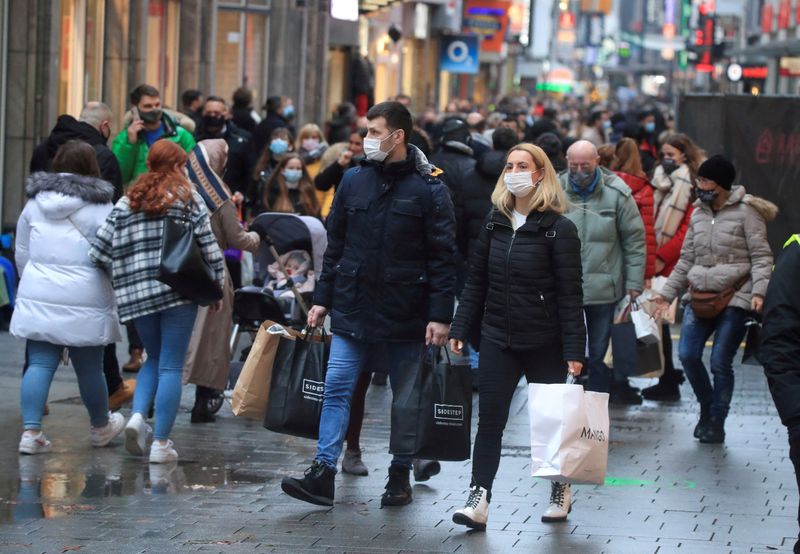By Jonathan Cable
LONDON (Reuters) -Euro zone business growth slowed more than expected this month as renewed restrictions imposed to curb the Omicron coronavirus variant curtailed the recovery in the bloc's dominant services industry, a survey showed on Thursday.
Europe is facing a fourth wave of infections and many governments have been encouraging citizens to stay home and avoid unnecessary social contact.
IHS Markit's Flash Composite Purchasing Managers' Index, a good indicator of overall economic health, dropped to 53.4 in December from 55.4 in November, its lowest since March and below the 54.0 predicted in a Reuters poll.
That headline number was dragged down by the services PMI, which sank to an eight-month low of 53.3 from 55.9. While above the 50-mark separating growth from contraction it missed the Reuters poll estimate for 54.1.
"The renewed decline in the Composite PMI in December suggests growth slowed to a crawl as tighter restrictions and growing consumer caution are taking their toll on economic activity, with the service sector bearing the brunt," said Michael Tran at Capital Economics.
Growth in demand for services dropped to its lowest since April - when it contracted - with the new business index falling to 52.6 from 54.2.
In the German private sector growth evaporated as restrictions hit the services sector in Europe's largest economy, earlier data showed.
Meanwhile, in France - the euro zone's second biggest economy and the only other country in the bloc to report flash data - activity expanded at a slower pace, a trend partly due to the new COVID-19 variant.
In Britain, outside the currency bloc, the new variant hammered hospitality and travel companies, sending private sector growth to a 10-month low, its PMI showed ahead of a Bank of England https://www.reuters.com/markets/europe/inflation-risk-omicron-slowdown-boe-rate-move-balance-2021-12-16 policy announcement due later on Thursday.
The Bank's decision is a close call. Investors had been largely betting against an increase in Bank Rate with the new coronavirus wave in full swing until data on Wednesday showed British consumer price inflation https://www.reuters.com/world/uk/uk-inflation-jumps-10-year-high-51-2021-12-15 leapt by far more than expected and hit a decade-high in November.
PRICE PRESSURES EASE
Factories, generally less affected by coronavirus restrictions, also suffered somewhat and the manufacturing PMI dipped to a 10-month low of 58.0 from November's 58.4. An index measuring output that feeds into the composite PMI nudged up to 53.9 from 53.8.
In one brighter spot for policymakers at the European Central Bank https://www.reuters.com/markets/rates-bonds/ecb-set-dial-back-stimulus-one-more-notch-2021-12-15, who meet later on Thursday, price pressures abated although remained high. The input prices index eased to 87.0 from 88.9, and the output prices index staged an even bigger fall.
"Price pressures have been easing in December, albeit only cautiously. It is a cautious sign of some easing pressures coming from supply shortages, which confirms some anecdotal evidence but it's way too early to conclude that the worst is behind us," said Bert Colijn at ING.
The ECB is set to halve the amount of assets it buys each month from April, according to a Reuters poll https://www.reuters.com/article/eurozone-economy-poll/ecb-to-halve-bond-purchases-from-april-say-economists-idUSKBN2IS00V of economists, although interest rate increases are likely years away.

But as the vaccine roll-out continues apace, optimism about the year ahead improved. The composite future output index recovered to 66.5 from 66.1.
"Forward-looking indicators also offered a glimmer of hope. Year-ahead sentiment improved marginally in December, in part due to hopes of further easing in supply-side disruptions following some encouraging signs in December," said Ricardo Amaro at Oxford Economics.